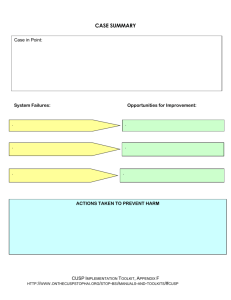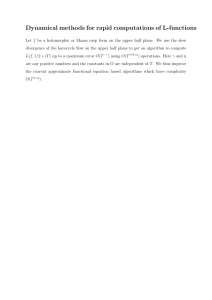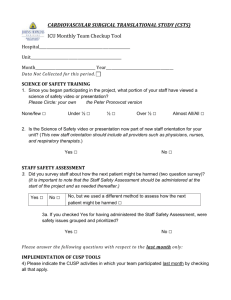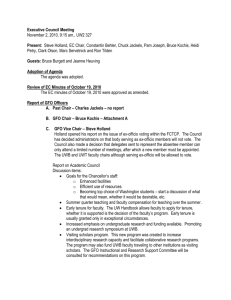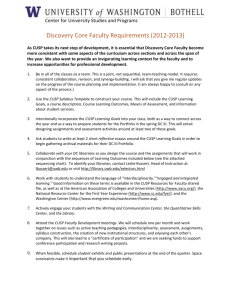Executive Council Meeting September 30, 2014, 8:45 a.m., UW1
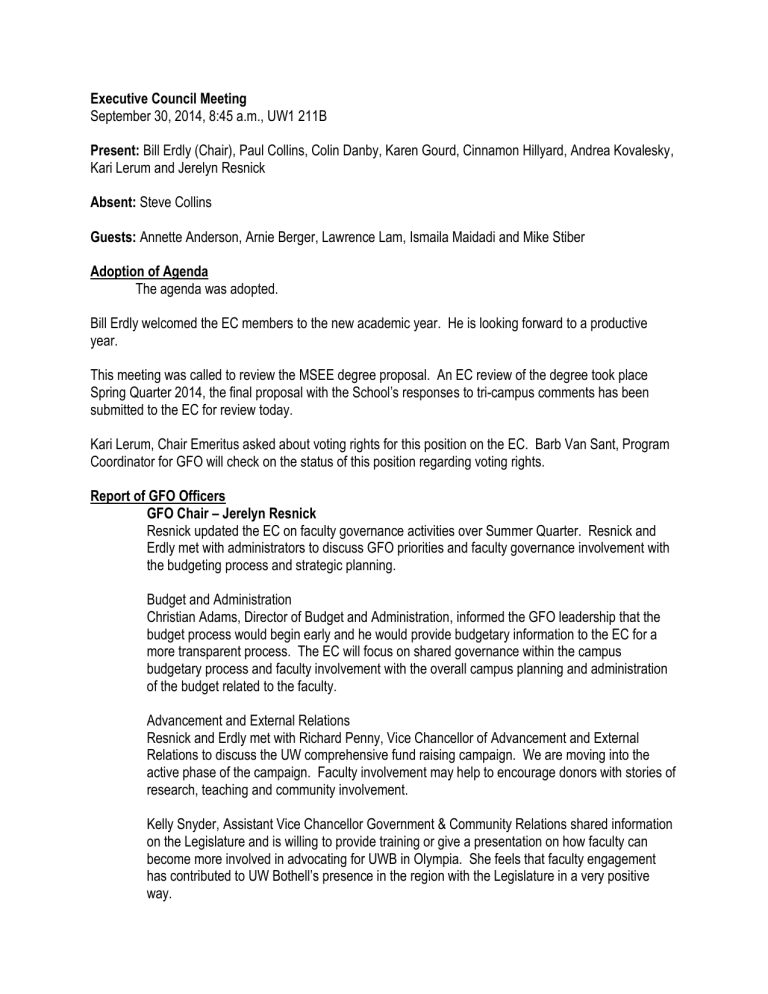
Executive Council Meeting
September 30, 2014, 8:45 a.m., UW1 211B
Present: Bill Erdly (Chair), Paul Collins, Colin Danby, Karen Gourd, Cinnamon Hillyard, Andrea Kovalesky,
Kari Lerum and Jerelyn Resnick
Absent: Steve Collins
Guests: Annette Anderson, Arnie Berger, Lawrence Lam, Ismaila Maidadi and Mike Stiber
Adoption of Agenda
The agenda was adopted.
Bill Erdly welcomed the EC members to the new academic year. He is looking forward to a productive year.
This meeting was called to review the MSEE degree proposal. An EC review of the degree took place
Spring Quarter 2014, the final proposal with the School’s responses to tri-campus comments has been submitted to the EC for review today.
Kari Lerum, Chair Emeritus asked about voting rights for this position on the EC. Barb Van Sant, Program
Coordinator for GFO will check on the status of this position regarding voting rights.
Report of GFO Officers
GFO Chair – Jerelyn Resnick
Resnick updated the EC on faculty governance activities over Summer Quarter. Resnick and
Erdly met with administrators to discuss GFO priorities and faculty governance involvement with the budgeting process and strategic planning.
Budget and Administration
Christian Adams, Director of Budget and Administration, informed the GFO leadership that the budget process would begin early and he would provide budgetary information to the EC for a more transparent process. The EC will focus on shared governance within the campus budgetary process and faculty involvement with the overall campus planning and administration of the budget related to the faculty.
Advancement and External Relations
Resnick and Erdly met with Richard Penny, Vice Chancellor of Advancement and External
Relations to discuss the UW comprehensive fund raising campaign. We are moving into the active phase of the campaign. Faculty involvement may help to encourage donors with stories of research, teaching and community involvement.
Kelly Snyder, Assistant Vice Chancellor Government & Community Relations shared information on the Legislature and is willing to provide training or give a presentation on how faculty can become more involved in advocating for UWB in Olympia. She feels that faculty engagement has contributed to UW Bothell’s presence in the region with the Legislature in a very positive way.
Administration and Planning
Resnick and Erdly will meet with Ana Karaman, Vice Chancellor of Administration and Planning today.
A quarterly GFO meeting is scheduled for Wednesday, November 5th, Discovery Hall 464.
Many of the issues discussed at the campus retreat will be on the agenda, campus growth and opportunities for development. Faculty must be present at the table for these decision-making discussions.
GFO Vice Chair – Bill Erdly
Erdly addressed the EC on shared governance across the 3 campus system. UWB is at a significant point in the development of this campus and its identity; a strong faculty governance role in strategic planning is critical at our campus level and at a tri-campus level. Kate O’Neill,
Faculty Senate Chair sees it as a responsibility for faculty to share in the governance of the
University – and is very supportive of, and interested in tri-campus issues. She was a great participant in the Faculty Council for Tri-campus Policy last year, which Erdly will Chair again this year. She will be chairing the SEC (Senate Executive Committee), this committee is the strategic planning committee for planning and development at the UW. The President and Provost attend these meetings where key budgetary and financial decisions are made. It is important for UWB to continue to build awareness and maintain a strong presence in SEC and in the Faculty
Senate. UWB should be involved at all levels of budgetary and policy decision making that impact the future of this campus.
Resnick and Erdly attended a meeting with VCAA Jeffords to discuss campus projects that faculty and staff can submit for funding. A budget has been allocated of $50,000 (initially) - with a potential for up to $200,000 (via the Chancellor) for “big idea” projects for this development on campus. Erdly indicated the importance of GFO leadership’s involvement in decision making on this funding.
With so many new administrative positions across campus, an organizational chart would clarify some of the centrally managed responsibilities and give faculty and staff more contact and resource information. Campus conversations on curriculum and promotion and tenure responsibilities and the role of GFO Councils in these areas is a future agenda item for the EC.
Some Schools would like to propose that these responsibilities reside within the Schools. There have been ongoing discussions on the benefits of campus-level councils in curricular review and
P&T or migrating these roles to the Schools. Both the Campus Council on Academic Standards and Curriculum and the Campus Council on Promotion, Tenure and Faculty Affairs will continue in their roles through this year. All GFO Bylaw changes will require ratification by the full voting faculty.
An EC member proposed a “Good of the Order” discussion point: the new Community-based
Learning position was reviewed by a faculty committee prior to the candidate search. The EC will discuss this matter further at a future date.
Academic Council
AC discussions on the UWB budget proposed going to a multi-year budget rather than a yearly budget, a 5-year timeframe was discussed. A 750-bed dorm is being added to residential
housing, what are the implications of this to other campus services? These are strategic planning matters, what is the direction of the campus and how does faculty governance weigh in on this issues? What support services do we need and what is the decision-making process for these funding projects? Erdly will invite George Theo to discuss ideas related to this project.
The administration plans to combine the Chancellor’s Office and Academic Affairs into one set of suites. This move could free up more office space for faculty.
Old Business
A.
CUSP Review Discussion – Colin Danby and Ismaila Maidadi
Danby updated the EC on the CUSP review. The review was initiated to help determine how CUSP can best fulfill its role in serving the institution. The Academic Council is focusing on the administrative model for First Year Programs. Danby discussed the student learning part with the EC. An outline of this report follows:
1.
Essential Facts about Current Service to Students
Continued growth of CUSP is expected.
Six-year graduation rates are good, improvement is needed in second-year retention.
CUSP has made a large contribution to diversity at UWB
The need for special academic support is growing
2.
What CUSP Offers Now
Three-course Discovery Core
Math and composition courses
Extensive academic support and advising
Foreign language courses
Introductory courses
3.
Key CUSP Review Committee findings:
The Discovery Core, Composition and Math classes should be retained in CUSP.
Providing this package will require: o Curriculum and teaching support o Personnel o Assessment of student learning
CUSP will need support of a dedicated unit with its own leadership.
A higher proportion of full-time faculty will better serve the work of curriculum and teaching support and reduce the number of part-time faculty.
Move other 100 and 200 level courses to Schools (exception of foreign languages)
CUSP is under-resourced.
The review will make decisions on the role of CUSP in meeting the needs of first-year and pre-major students at UWB. The final report will make recommendations for the future direction and structure of CUSP
EC discussion points
What is the timeline for CUSP? The EC approved the CUSP Charter through Autumn 2014, there may need to be an extension on this timeline.
What foreign languages does CUSP teach? Japanese, Spanish and Chinese are taught.
The current structure of CUSP will remain through this academic year.
The increase in a diverse student population has increased the need for support services.
Support has been incorporated into the curriculum and the design of assignments.
UWB Student Success Center bring together resources for student support.
The 4-year graduation rate will be a measure of the success of support services.
Pathways to majors is a focus, curriculum bridges to majors. Math bridges to STEM, other bridge courses are being incorporated.
Retention is a major issue nationally.
Danby will keep the EC updated on the status of the CUSP review, further discussion will continue.
New Business
A.
MSEE full proposal—Lawrence Lam and Arnie
Berger
Professor Lam presented the final proposal for an MS in Electrical Engineering to the EC.
This program will be fee-based in coordination with UW Professional and Continuing
Education (PCE). The program will target BSEE students as well as students and professionals in other technical disciplines wishing to take advanced courses in Electrical
Engineering. The program offers a thesis and non-thesis option, and a certificate program, with day and evening classes and a hybrid model with online delivery for some courses.
Academic options:
Certificate program – 6 courses, 18 credits
Non thesis, coursework-based option – 10 courses, 46 credits
Thesis option – 8 courses, 36 credits and 10 credit thesis
The MSEE thesis option offers a pathway to a PhD. program in EE.
Lam’s presentation outlined the benefits to students, coursework for the thesis and non- thesis track, enrollment information, current status of the degree program and addressed the external review comments. The proposal will go to the Board of Regents October 9 agenda.
EC discussion points
How is diversity encouraged in the program? What actions have been taken to recruit women into this program? The program needs to present evidence on diversity, make it explicit in the proposal. Berger stated that the program works in partnership with the STEM Advisory Board and in community partnerships.
Can the time to degree completion be extended to accommodate students who are parents? Yes.
Are resources (lab space) adequate? Stiber stated that resources are adequate.
This program offers a focus that UWS programs do not, it meets local needs, has more integrated units for the whole system and utilizes current faculty expertise.
EC motion
Resnick moved to pass the motion:
“The EC endorses forwarding the School of STEM’s proposal for MSEE to the UW Regents for review.”
The motion was seconded.
Erdly called the question on the original motion, there was no further discussion. Hearing no objection, he called for a vote on it. By show of hands, the motion carried unanimously (7-0). Steve Collins will register a vote in absentia today.
Old Business continued
A.
CUSP Review Discussion – Colin Danby
Danby reopened discussion on the CUSP review. The committee recommended the creation of a free standing unit with appointing power for faculty. The EC also discussed an Organizational Redesign Proposal – A Draft including AC feedback on First Year
Programs(FYPs) submitted by Brad Portin, Dean of the School of Educational Studies.
Some of the issues addressed in this transitional proposal:
CUSP/FYPs is not an appointing unit, complicating the organization and support of faculty
Over reliance of PT faculty to deliver courses
CUSP/FYPs have less connection to the related disciplines and faculty in Schools.
Establishment of units of FYPs in Schools.
Unit in each School to be led by faculty member who become FYPs Coordinating
Council.
Budgetary resources are another consideration. Any reorganization must fit within the current budgetary resources.
EC discussion points
What is the full-time faculty goal in CUSP, percentage of full-time faculty?
How will the review and hiring of part-time faculty work?
Budgetary resources, where will the money for full-time faculty come from?
What will Leslie Ashbaugh’s position be in the new organization? She will continue to work as a cross campus coordinator, creating pathways for students into degree programs.
The CUSP successor must be a model with a faculty governance point of view, we must think about how units fit together and how faculty will be hired, reviewed and retained, full and part-time faculty. Danby will continue updating the EC on the re-organization of CUSP.
B.
EC vote on Nursing 1+2+1 proposal, tri-campus comments
Erdly opened discussion on the Nursing 1+2+1 proposal, the EC approved moving forward the Nursing and
Health Studies First Year Entry BSN proposal to the UW Registrar for Tri-campus Review Spring Quarter.
The EC reviewed the School’s responses to the tri-campus review comments and recommends the School revise the responses. Kovalesky will work with Dean Allen to revise the responses.
EC motion
Collins moved to pass the motion:
“The EC tables the discussion on the Nursing 1+2+1 proposal, tri-campus comments”. The EC will review the revised comments at a later date.
Erdly called the question on the original motion, there was no further discussion. Hearing no objection, he called for a vote on it. By show of hands, the motion carried unanimously (7-0)
.
Reports from Program Representatives – no reports
A.
Business – Collins
B.
CUSP – Danby
C.
Education – Gourd
D.
Interdisciplinary Arts & Sciences – Edwards
E.
Nursing and Health Studies – Kovalesky
F.
STEM – Collins
Meeting adjourned at 10:45 am
Minutes submitted by Barbara Van Sant
The next meeting will be October 7, 2014
